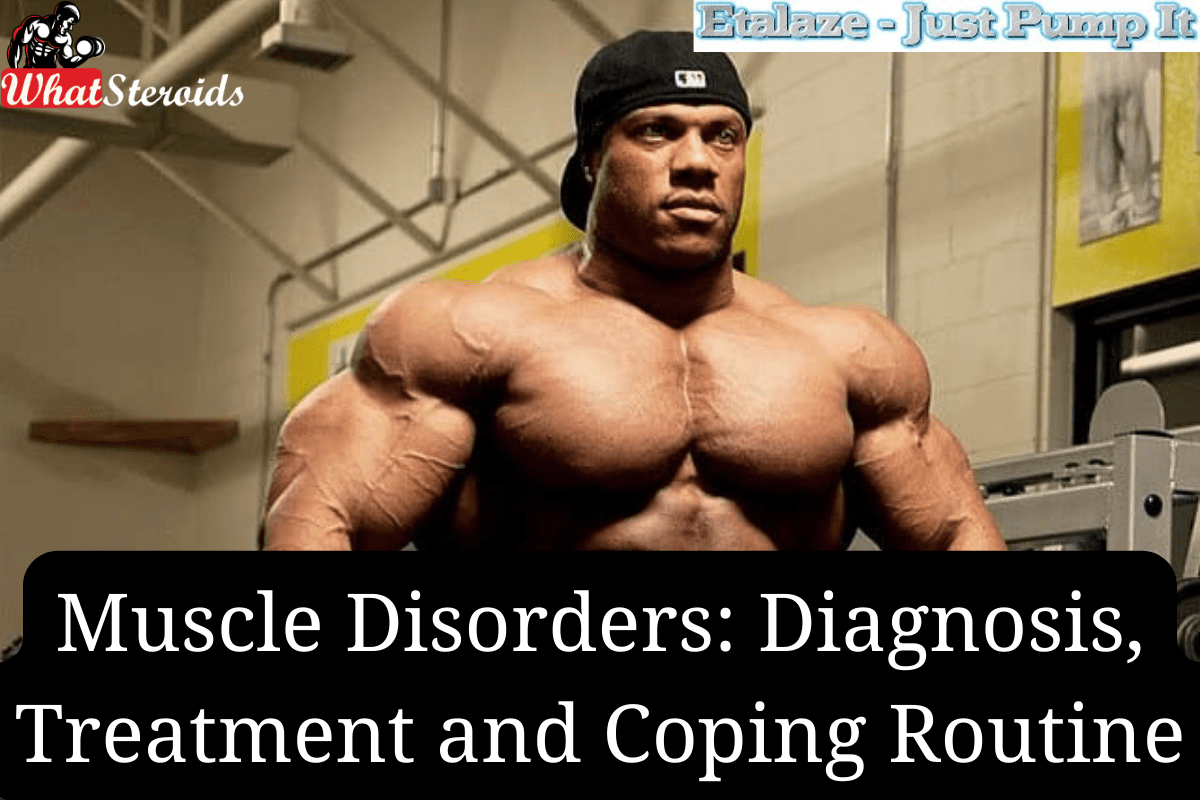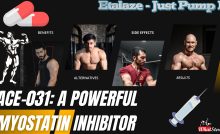Muscle Disorders: Diagnosis, Treatment and Coping Routine


Bodybuilders are susceptible to a range of muscle disorders and conditions due to the intense physical demands they place on their muscles and the use of dietary supplements and performance-enhancing substances. Here are some muscle disorders that can affect you as a bodybuilder. We have also discussed muscle care routines to help preserve your muscles.
Muscle Strains
Muscle strains, also known as pulled muscles, can occur when a muscle is stretched or torn due to overuse, improper form, or lifting weights too heavy. Bodybuilders often push their muscles to the limit, increasing the risk of strains.
Muscle Tears
Muscle tears are more severe than strains involving muscle fibers' complete or partial rupture. This can result from lifting extremely heavy weights or performing exercises with poor form.
Tendonitis
Tendonitis is the inflammation of tendons, which connect muscles to bones. Repetitive stress from weightlifting can lead to tendonitis, causing pain and discomfort, especially in areas like the shoulders, elbows (tennis elbow), and knees (patellar tendonitis).
Rotator Cuff Injuries
The rotator cuff is a group of muscles and tendons that stabilize the shoulder joint. Overhead lifting and repetitive shoulder exercises in bodybuilding can lead to rotator cuff injuries, such as tears or inflammation.
Muscle Imbalances
Focusing too much on certain muscle groups while neglecting others can result in muscle imbalances. These imbalances can lead to improper joint mechanics and increase the risk of injuries.
Compartment Syndrome
Intense muscle swelling during and after workouts can lead to compartment syndrome, where pressure within a muscle compartment increases significantly. This can impede blood flow and nerve function, causing severe pain and potential muscle damage.
Rhabdomyolysis
Extreme exertion, especially in cases of overtraining, can lead to rhabdomyolysis, a condition where muscle tissue breaks down rapidly, releasing harmful substances into the bloodstream. Rhabdomyolysis can lead to kidney damage and other serious complications.
Steroid-Related Muscle Disorders
Some bodybuilders use anabolic steroids to enhance muscle growth, which can adversely affect muscles. This may include muscle atrophy (wasting), muscle weakness, and increased muscle tears or strain risk.
Overtraining Syndrome
Bodybuilders who overtrain without allowing sufficient rest and recovery can experience overtraining syndrome. Symptoms may include chronic fatigue, muscle soreness, and a decline in performance.
Muscle Dysmorphia
While not a physical muscle disorder, muscle dysmorphia is a psychological condition that affects some bodybuilders. It involves an obsessive preoccupation with muscle size and a distorted body image, which can lead to unhealthy behaviors and negative mental health outcomes.
Diagnosis of Muscle Disorders
Doctors can detect muscle disorders through clinical assessments, medical history, physical examinations, and diagnostic tests. Here's an overview of how muscle disorders are typically detected:
-
Medical History
The doctor will begin by taking a detailed medical history, which includes asking questions about the patient's symptoms, when they started, and any relevant family medical history. Information about medications, previous injuries, and exercise habits may also be important.
-
Physical Examination
A thorough physical examination is crucial. The doctor will examine the affected muscles and surrounding areas for signs of muscle weakness, atrophy (muscle wasting), muscle spasms, twitching, or tenderness. They will also assess joint mobility and overall muscle tone.
-
Neurological Examination
Since the nervous system controls muscles, a neurological examination may be performed to assess reflexes, sensation, coordination, and muscle strength. This can help determine if the issue is primarily muscular or has a neurological component.
-
Laboratory Tests
Blood Tests: Blood tests can help identify specific markers associated with muscle disorders, such as creatine kinase (CK) levels, which can be elevated in conditions like muscular dystrophy or rhabdomyolysis.
Electrolyte Levels: Abnormalities in electrolyte levels, such as potassium or calcium, can contribute to muscle problems and may be checked via blood tests.
-
Imaging Studies
MRI (Magnetic Resonance Imaging): MRI scans can provide detailed images of muscles and surrounding structures, helping to identify muscle inflammation, injuries, or tumors.
CT (Computed Tomography): CT scans may assess muscle and soft tissue conditions in certain cases.
-
Electromyography (EMG)
EMG involves the insertion of fine needles into the muscles to measure electrical activity. It can help diagnose neuromuscular disorders and determine the health of muscles and the nerves controlling them.
-
Nerve Conduction Studies (NCS)
NCS assesses how well the nerves can transmit electrical signals to the muscles. It can help identify nerve-related causes of muscle problems.
-
Muscle Biopsy
In some cases, a small sample of muscle tissue may be extracted and analyzed under a microscope to identify abnormalities in muscle structure and function. This is often done for conditions like muscular dystrophy.
-
Genetic Testing
Genetic tests can identify genetic mutations associated with inherited muscle disorders like muscular dystrophy or myotonic dystrophy.
-
Specialized Tests
Additional specialized tests may be conducted depending on the suspected muscle disorder. For example, a skin biopsy might be performed in cases of dermatomyositis, or a lumbar puncture (spinal tap) may be done if there are suspicions of inflammatory muscle disorders involving the central nervous system.
The diagnostic process can vary depending on the symptoms and suspected underlying condition. Doctors often use a combination of these tools to arrive at a precise diagnosis. Once a diagnosis is made, the appropriate treatment plan can be developed to manage the muscle disorder and alleviate symptoms.
Treatment/Management
The treatment of muscle disorders in bodybuilders depends on the specific condition and its severity. It's crucial to consult with a healthcare professional or a sports medicine specialist for a proper diagnosis and tailored treatment plan. Here are some treatment procedures for common muscle disorders that may affect bodybuilders:
Related Article: Top 15 Bulking Supplements Today
-
Rest and Recovery:
- In many cases, muscle disorders require a period of rest to allow the affected muscles to heal. Avoiding strenuous exercise is essential to prevent further damage.
-
Medications:
- Non-steroidal anti-inflammatory drugs (NSAIDs), such as ibuprofen, may be prescribed to reduce pain and inflammation associated with muscle strains, tendonitis, or overuse injuries.
- For certain conditions, such as autoimmune muscle disorders, corticosteroids or other immunosuppressive medications may be necessary to manage inflammation and symptoms.
- Physical Therapy:
- Physical therapy can be beneficial for muscle disorders. A physical therapist can create a customized exercise program to improve flexibility, strength, and range of motion while minimizing the risk of reinjury.
-
Heat and Cold Therapy:
- Ice packs (cold therapy) can help reduce inflammation and relieve pain in the acute phase of some muscle injuries.
- Heat therapy (e.g., warm compresses or heating pads) may relax and soothe muscles, particularly for muscle spasms or chronic conditions.
-
Massage and Manual Therapy:
- Massage therapy and techniques like myofascial release can help alleviate muscle tension, improve blood flow, and reduce muscle soreness.
-
Bracing or Splinting:
- During healing, orthopedic braces or splints may be prescribed to support and immobilize injured muscles or joints.
-
Activity Modification:
- Adjusting your exercise routine to avoid aggravating the affected muscles is crucial. Your healthcare provider or physical therapist can guide safe exercise modifications.
-
Nutrition and Hydration:
- Maintaining a well-balanced diet rich in nutrients, particularly protein, can support muscle repair and recovery.
- Staying properly hydrated helps prevent muscle cramps and aids in overall recovery.
- Injections:
- Local anesthetics or corticosteroid injections may be recommended for pain relief and muscle relaxation in certain conditions like myofascial pain syndrome or trigger points.
- Surgery (in severe cases):
- Surgical intervention may be necessary for muscle disorders that involve significant tears, ruptures, or compartment syndrome.
- Psychological Support:
- For conditions like muscle dysmorphia or other mental health issues related to bodybuilding, therapy, and counseling can be valuable for addressing psychological factors contributing to the disorder.
- Education and Prevention:
- Learning about proper training techniques, warm-up and cool-down routines, and injury prevention strategies can help prevent future muscle disorders.
Must Read: All Bodybuilding Categories Explained
Muscle Care Routine to Follow
A comprehensive muscle care routine is crucial for bodybuilders to optimize muscle growth, prevent injuries, and promote overall health and well-being. Here's a structured muscle care routine for bodybuilders:
Warm-Up and Stretching
Begin each workout with a proper warm-up to increase blood flow and prepare your muscles for exercise. This can include light cardio, dynamic stretching, and mobility exercises.
After your workout, perform static stretches for each major muscle group to improve flexibility and prevent post-workout muscle tightness.
Proper Nutrition
Maintain a balanced diet rich in lean protein, complex carbohydrates, healthy fats, and various fruits and vegetables.
Ensure you're getting enough protein to support muscle repair and growth.
Stay hydrated by drinking plenty of water to help prevent muscle cramps and dehydration.
Supplementation (if desired)
Consult with a healthcare professional or sports nutritionist to determine whether supplements are appropriate for your goals. Common supplements for bodybuilders include protein powder, creatine, branched-chain amino acids (BCAAs), and multivitamins.
Proper Technique
Focus on proper exercise form and technique to reduce the risk of injuries. Consider working with a qualified personal trainer or coach, especially if you're new to lifting.
Progressive Overload
Gradually increase your workout intensity, weight, or resistance to stimulate muscle growth. Avoid lifting excessively heavy weights too soon, which can lead to injuries.
Adequate Rest and Recovery
Ensure you get enough sleep (7-9 hours per night) to support muscle recovery and overall health.
Allow muscle groups to rest for at least 48 hours between intense workouts targeting the same area.
Consider incorporating active recovery days, where you engage in low-intensity activities like walking or swimming.
Foam Rolling and Self-Massage
Use foam rollers, massage sticks, or massage balls to target areas of muscle tightness and knots. This can help improve flexibility and reduce muscle soreness.
Ice Baths and Contrast Baths
Some athletes relieve muscle soreness by alternating between hot and cold baths or showers. This method is known as contrast therapy.
Hygiene and Injury Prevention
Maintain good hygiene to prevent skin infections, especially in gyms and other shared workout spaces.
Use proper protective gear, such as weightlifting belts and wrist wraps, when necessary to support your muscles and joints.
Regular Check-Ups
Periodically consult with a sports medicine specialist or physical therapist to assess your overall musculoskeletal health and address any emerging issues.
Stress Management
High stress levels can affect muscle recovery and overall health. Incorporate stress-reduction techniques like meditation, yoga, or deep breathing exercises into your routine.
Listen to Your Body
Pay attention to any signs of pain, discomfort, or fatigue. It's essential to differentiate between normal muscle soreness and potential injuries. If you suspect an injury, seek professional medical advice.
Muscle Disorders Could Be Connected to Diet
Bodybuilders should focus on a balanced and nutritious diet to support their muscle growth and overall health. While there aren't specific foods that bodybuilders must completely avoid to prevent muscle disorders, there are certain foods and dietary practices they should be cautious about or limit to maintain optimal health and performance. Here are some examples:
Excessive Processed Foods
Highly processed foods, such as sugary snacks, fast food, and sugary drinks, can lead to weight gain, inflammation, and insulin resistance. These factors can negatively impact muscle health over time.
Trans Fats
Trans fats, often found in fried foods and many commercial baked goods, can contribute to inflammation and increase the risk of heart disease, which may hinder muscle function.
Excessive Sugars
Consuming excessive added sugars can lead to weight gain, insulin spikes, and inflammation, negatively affecting muscle health. Sugary foods and beverages should be consumed in moderation.
Alcohol
Excessive alcohol consumption can interfere with muscle protein synthesis and recovery. It can also dehydrate the body, potentially affecting workout performance.
Too Much Sodium
A diet high in sodium can lead to water retention and increased blood pressure, which may not directly affect muscle disorders but can negatively impact overall health.
Inadequate Protein Intake
While not a food to avoid, bodybuilders must consume enough protein to support muscle repair and growth. A lack of protein can hinder muscle development.
Low-Fiber Foods
A diet low in fiber can lead to digestive issues, such as constipation, which can be uncomfortable for bodybuilders. Fiber is also important for overall health and nutrient absorption.
High Caffeine Intake
While moderate caffeine consumption can boost performance, excessive intake can lead to anxiety, sleep disturbances, and increased heart rate, which may negatively affect recovery.
Skipping Meals
Consistently missing meals can lead to inadequate nutrient intake, affecting muscle recovery and overall health.
Fad Diets
Extreme diets severely restricting certain food groups can lead to nutrient deficiencies and negatively impact muscle health. It's important to follow a balanced and sustainable nutrition plan.
Bodybuilders should prioritize a diet rich in lean protein, complex carbohydrates, healthy fats, fruits, vegetables, and plenty of water to support muscle growth and overall health. They should also monitor their nutritional needs based on their goals and consult a registered dietitian or nutritionist for personalized guidance. Proper supplementation and regular exercise are crucial components of a successful bodybuilding regimen.
Overall
Bodybuilders must prioritize proper training techniques, adequate rest and recovery, and nutrition to reduce the risk of these muscle disorders. Additionally, consulting with a healthcare professional or sports medicine specialist can help prevent and manage muscle-related issues in bodybuilding. Building muscle takes time, and caring for your muscles is as important as challenging them during workouts. Always prioritize safety and long-term health in your muscle care routine.
Also Read: What Are The Stages of Topical Steroids Withdrawal?
Recent Posts
Steroid Shops Review
osgear.se Reviews ⭐⭐⭐⭐⭐ Score: 97.78% Osgear has consistently maintained a 99% customer satisfaction rate across key…
ACE-031: A Powerful Myostatin Inhibitor
ACE-031 is a synthetic peptide designed to block myostatin, a natural regulator of muscle growth.…
Decoding IGF-1 LR3: A Guide to its Benefits
IGF-1 LR3 (Insulin-like Growth Factor-1 Long Arg3) is a synthetic variant of IGF-1, a hormone…
AOD-9604: The Fat-Burning Peptide Explained
AOD-9604, along with the similar HGH Frag 176-191, is a peptide derived from Growth Hormone…
Understanding Trenbolone-Induced Cough (“Tren Cough”)
Trenbolone, a potent anabolic steroid, can sometimes cause “tren cough”—a sudden and intense coughing episode…
Creatine vs Myostatin: An Expert’s Analysis
Myostatin, a protein encoded by the MSTN gene, acts as a regulator of muscle growth.…


